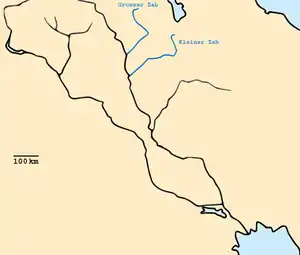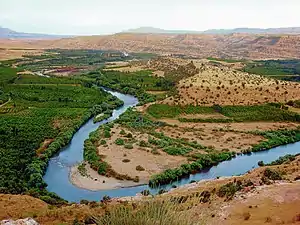750
Year 750 (DCCL) was a common year starting on Thursday (link will display the full calendar) of the Julian calendar. The denomination 750 for this year has been used since the early medieval period, when the Anno Domini calendar era became the prevalent method in Europe for naming years.
| Millennium: | 1st millennium |
|---|---|
| Centuries: | |
| Decades: | |
| Years: |
| 750 by topic |
|---|
| Leaders |
|
| Categories |
|
| Gregorian calendar | 750 DCCL |
| Ab urbe condita | 1503 |
| Armenian calendar | 199 ԹՎ ՃՂԹ |
| Assyrian calendar | 5500 |
| Balinese saka calendar | 671–672 |
| Bengali calendar | 157 |
| Berber calendar | 1700 |
| Buddhist calendar | 1294 |
| Burmese calendar | 112 |
| Byzantine calendar | 6258–6259 |
| Chinese calendar | 己丑年 (Earth Ox) 3446 or 3386 — to — 庚寅年 (Metal Tiger) 3447 or 3387 |
| Coptic calendar | 466–467 |
| Discordian calendar | 1916 |
| Ethiopian calendar | 742–743 |
| Hebrew calendar | 4510–4511 |
| Hindu calendars | |
| - Vikram Samvat | 806–807 |
| - Shaka Samvat | 671–672 |
| - Kali Yuga | 3850–3851 |
| Holocene calendar | 10750 |
| Iranian calendar | 128–129 |
| Islamic calendar | 132–133 |
| Japanese calendar | Tenpyō-shōhō 2 (天平勝宝2年) |
| Javanese calendar | 644–645 |
| Julian calendar | 750 DCCL |
| Korean calendar | 3083 |
| Minguo calendar | 1162 before ROC 民前1162年 |
| Nanakshahi calendar | −718 |
| Seleucid era | 1061/1062 AG |
| Thai solar calendar | 1292–1293 |
| Tibetan calendar | 阴土牛年 (female Earth-Ox) 876 or 495 or −277 — to — 阳金虎年 (male Iron-Tiger) 877 or 496 or −276 |

Map of the Great Zab river (Northern Iraq)

The Great Zab river near Erbil (Iraq)
Events
Umayyad Caliphate
- January 25 – Battle of the Zab: Abbasid forces under Abdallah ibn Ali defeat the Umayyads near the Great Zab River. Members of the Umayyad house are hunted down and killed. Defeated by his rivals, Caliph Marwan II flees westward to Egypt, perhaps attempting to reach Al-Andalus (Iberian Peninsula), where there are still significant Umayyad armies.[1]
.jpg.webp)
Al-Saffah became caliph (ruler) of the Islamic Caliphate on 25 January 750. He ruled from 750 to 10 June 754.
- August 6 – Marwan II is caught and killed at Faiyum by supporters of the Abbasid caliph As-Saffah. Almost the entire Umayyad Dynasty is assassinated; Prince Abd al-Rahman I escapes to Al-Andalus. The Abbasids assume control of the Islamic world and establish their first capital at Kufa.
Europe
- King Alfonso I of Asturias establishes the Kingdom of Galicia, in roughly the northwest of the Iberian Peninsula. The exact time this happened is contested.
- The town Slaný in the Central Bohemian Region (Czech Republic) is founded at the site of a salt spring, according to one chronicle written in the sixteenth century (approximate date).
Britain
- King Eadberht of Northumbria imprisons Cynewulf, bishop of Lindisfarne, at Bamburgh Castle. King Eadberht does this in order to punish the bishop for sheltering one of his enemies, Prince Offa. He then besieges Prince Offa, son of the late King Aldfrith, in Lindisfarne Priory. Almost dead from hunger, he is dragged from his sanctuary and put to death.[2]
- Battle of Mugdock: The Strathclyde Britons under King Teudebur defeat Prince Talorgan of the Picts. This leads to the decline of the power of King Óengus I.[3]
Africa
- The Ghana Empire begins (approximate date).
India
- Gopala I is proclaimed as the first ruler and founder of the Pala Empire.
America
- Native Americans, in the area now known as the Four Corners, begin constructing and occupying pueblos.
- The city of Teotihuacan (modern Mexico) is destroyed and left in ruins, its palaces burned to the ground.
Indonesia
- Borobudur, or Barabudur (a Mahayana Buddhist temple in Magelang, Central Java, Indonesia, as well as the world's largest Buddhist temple, and also one of the greatest Buddhist monuments in the world) is built (approximate date).
Art
- The "Western Paradise" of Amitābha Buddha, detail of a wall painting in Cave 217, Dunhuang (China), is made during the Tang Dynasty (approximate date).
Food and drink
- In China during the Tang Dynasty, a bargeload of tea (a medicinal herb) comes up the Grand Canal to Luoyang, from Zhejiang (approximate date).
Births
- January 25 – Leo IV, Byzantine emperor (d. 780)
- Abbas ibn al-Ahnaf, Abbasid poet (d. 809)
- Abd al-Malik ibn Salih, Abbasid general (d. 812)
- Arno, archbishop of Salzburg (approximate date)
- Bermudo I, king of Asturias (approximate date)
- Clement, Irish scholar and saint (approximate date)
- Eigil of Fulda, Bavarian abbot (approximate date)
- Hildegrim, bishop of Châlons (approximate date)
- Leo III, pope of the Catholic Church (d. 816)
- Ragnvald Sigurdsson, great-grandfather to Harald Hårfagre
- Sawara, Japanese prince (approximate date)
- Theodulf, bishop of Orléans (or 760)
- Wu Shaocheng, general of the Tang Dynasty (d. 810)
Deaths
- January 25 – Ibrahim ibn al-Walid, Umayyad caliph
- August 6 – Marwan II, Umayyad caliph (b. 688)
- Abdallah ibn Abd al-Malik, Umayyad prince (or 749)
- Agilulfus, bishop of Cologne (approximate date)
- Al-Abbas ibn al-Walid, Umayyad prince and general
- Basil the Confessor, Eastern Orthodox saint
- Boruth, prince (knyaz) of Carantania (approximate date)
- Bressal mac Áedo Róin, Dál Fiatach king of Ulaid
- Burchard, bishop of Würzburg (approximate date)
- Himelin, Scottish priest (approximate date)
- Inreachtach mac Dluthach, king of Uí Maine (Ireland)
- Irene of Khazaria, Byzantine empress (approximate date)
- Isonokami no Otomaro, Japanese nobleman
- Veborg, Scandinavian shieldmaiden (approximate date)
References
External links
 Media related to 750 at Wikimedia Commons
Media related to 750 at Wikimedia Commons
This article is issued from Wikipedia. The text is licensed under Creative Commons - Attribution - Sharealike. Additional terms may apply for the media files.